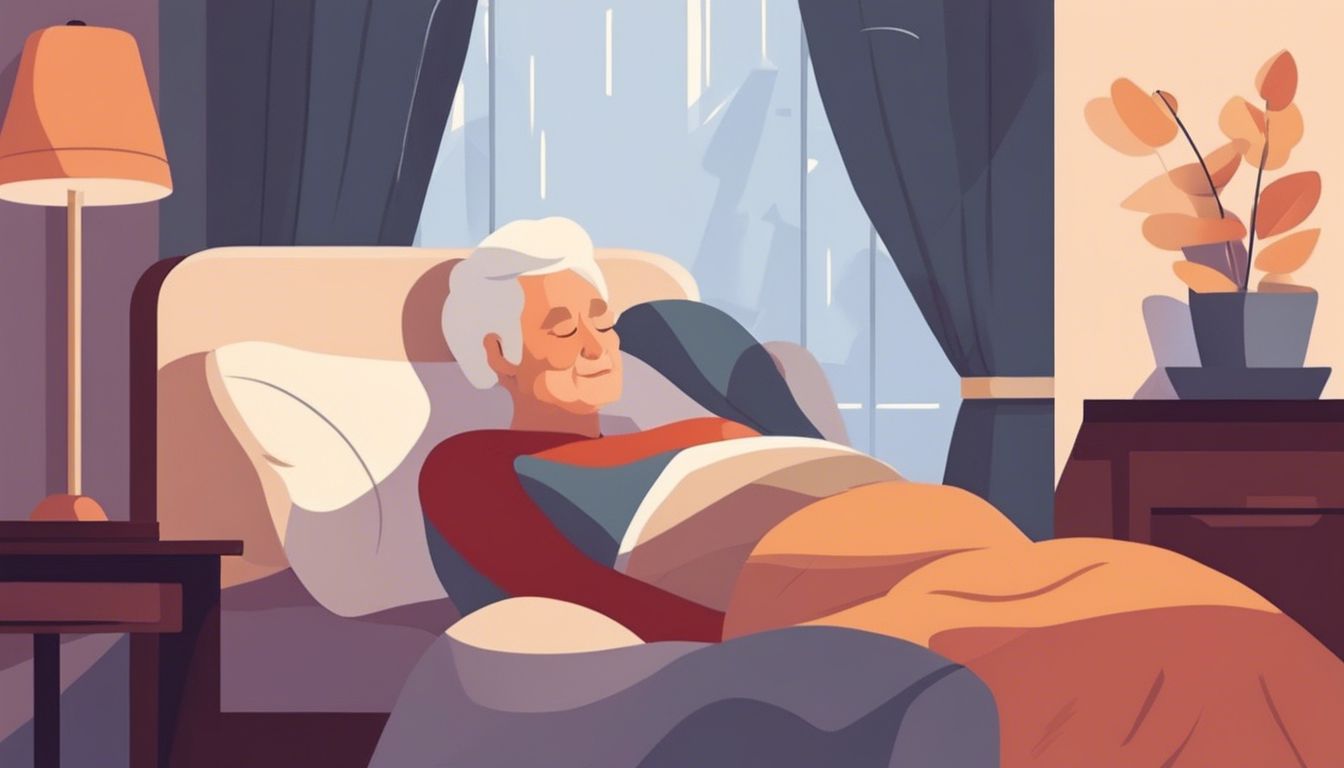Caring for seniors with memory issues can be challenging. Aromatherapy uses essential oils to promote relaxation and reduce anxiety in older adults. This article explores how aromatherapy and other sensory therapies can enhance senior comfort and well-being.
Discover effective ways to improve quality of life for your loved ones.
📋✅
- Aromatherapy using essential oils like lavender and rosemary can reduce agitation, ease memory issues, and boost mood in seniors with dementia.
- 73% of memory care facilities are interested in using aromatherapy, according to a Beekley Medical survey.
- Music therapy and reminiscence therapy engage seniors’ senses to trigger positive memories and emotions, reducing the need for antipsychotic medications in some cases.
- Light therapy improves sleep quality and decreases depression symptoms in elderly patients by regulating circadian rhythms.
- Integrating multiple sensory interventions like aromatherapy, music, and light therapy creates a more soothing environment for seniors in care facilities or at home.
Benefits of Aromatherapy in Senior Comfort

Aromatherapy offers powerful benefits for seniors’ comfort and well-being. It can ease memory issues, reduce stress, and boost mood through the use of essential oils.
Calming effects on memory issues
Aromatherapy offers calming effects for seniors with memory issues. Essential oils like lavender and rosemary can reduce agitation and improve cognitive function in Alzheimer’s patients.
A Beekley Medical survey found 73% of memory care facilities are interested in using aromatherapy. This sensory intervention engages the olfactory system, linked to the brain’s limbic system controlling emotions and memories.
Peppermint and lemon oils may enhance memory recall and concentration in older adults struggling with cognitive decline.
Essential oils can be diffused in senior living spaces or applied topically during massage therapy sessions. These aromatic compounds potentially decrease stress, enhance mood, and promote better sleep patterns among elderly individuals.
Next, we’ll explore specific essential oils commonly used in senior care settings.
Reduction in agitation and stress
Building on the calming effects for memory issues, aromatherapy also tackles agitation and stress in seniors. Essential oils like lavender and chamomile prove effective in soothing anxious behaviors.
Elequil®, a clinical aromatherapy patch, offers an alternative to traditional treatments for whole-person care.
Aromatherapy counters common dementia behaviors like agitation, aggression, and apathy. – Carol Corio, Aromatherapy Expert
Studies show specific scents benefit elderly patients: herbal aromas reduce stress, while citrus scents boost focus and motivation. This sensory intervention helps decrease dependency on antipsychotic drugs in long-term care facilities.
Aromatherapy massage further enhances these benefits, promoting relaxation and improving sleep quality for seniors with dementia or Alzheimer’s disease.
Enhancement of overall mood and well-being
Aromatherapy’s benefits extend beyond stress reduction to overall mood enhancement. Essential oils like lavender and rosemary stimulate the olfactory system, triggering positive emotions and memories in seniors.
This sensory intervention improves quality of life for elderly individuals, especially those with dementia. Elequil aromatabs® offer a personal aromatherapy solution, worn on clothing to provide continuous mood-boosting scents.
Familiar fragrances such as freshly cut grass or sugar cookies create a comforting environment, promoting well-being and reducing feelings of loneliness in assisted living facilities or nursing homes.
Key Essential Oils Used in Aromatherapy for Seniors
Essential oils offer powerful benefits for seniors’ well-being. Certain oils stand out for their calming and mood-enhancing properties.
Lavender
Lavender essential oil offers powerful benefits for senior comfort. This versatile aromatic extract reduces anxiety, promotes better sleep, and alleviates agitation in older adults.
Studies show lavender effectively addresses insomnia and restlessness, common issues affecting 50% of seniors with severe dementia. Its soothing properties make it a go-to choice for aromatherapy in care homes and memory units.
Lavender: Nature’s tranquil remedy for senior well-being.
Caregivers can easily integrate lavender into daily routines. Diffuse the oil in living spaces, add a few drops to bathwater, or apply diluted oil to pulse points. For sleep support, place lavender sachets under pillows or use lavender-scented linen sprays.
Next, we’ll explore cedarwood, another beneficial essential oil for senior care.
Cedarwood
Cedarwood essential oil offers powerful benefits for senior care. Its calming and grounding effects promote relaxation, reduce anxiety, and improve sleep quality in elderly individuals with memory issues.
The oil’s scent triggers positive emotions, providing comfort and familiarity. This natural approach engages the olfactory system, positively impacting the brain’s limbic region responsible for emotions and memories.
Cedarwood aromatherapy enhances overall mood and well-being in seniors, making it a valuable tool for caregivers in managing dementia-related symptoms.
Rosemary
Rosemary essential oil offers cognitive benefits for seniors. It improves memory and concentration, engaging the olfactory system linked to the brain’s limbic region. This connection influences emotions and memories.
Studies suggest rosemary may enhance cognitive function in Alzheimer’s patients. Caregivers can use rosemary oil in diffusers or apply it diluted to seniors’ skin for potential mental clarity and mood elevation.
Integrating Aromatherapy into Senior Care
Aromatherapy can be easily added to senior care routines in homes, memory care centers, and assisted living facilities. Learn more about how this natural approach can boost comfort and well-being for older adults.
In-home use
Aromatherapy offers numerous benefits for seniors in home settings. Scented candles, wax melts, and essential oil blends create a soothing atmosphere. These products can help reduce agitation and improve mood.
Caregivers should supervise use, especially for those with advanced dementia, to prevent allergic reactions or skin irritation.
Elequil® provides an alternative to traditional treatments for whole-person care at home. Comforting scents like freshly cut grass, sugar cookies, and clean linen evoke positive memories.
Lavender oil, known for its calming properties, aids in relaxation and promotes better sleep for elderly adults experiencing sleep disturbances.
Memory care communities
Memory care communities offer specialized environments for seniors with cognitive impairments. These facilities integrate aromatherapy into daily care routines to enhance resident comfort.
A Beekley Medical survey revealed 73% of memory care facilities express interest in aromatherapy programs. Many communities use diffusers, scented products, and personalized aromatherapy sessions to create calming atmospheres.
Elequil aromatabs®, wearable aromatherapy products, show promise in reducing anxiety among dementia patients. This holistic approach helps decrease agitation and improve overall well-being for residents.
Light therapy serves as another sensory intervention used in memory care settings.
Senior living facilities
Senior living facilities increasingly embrace aromatherapy to enhance resident comfort. Beekley Medical’s survey reveals 73% of memory care facilities express interest in aromatherapy integration.
These facilities utilize diffusers, scented products, and personalized sessions to create a soothing environment. Elequil aromatabs®, a wearable aromatherapy product, shows promise in reducing anxiety among dementia patients.
Carol Corio’s therapeutic aromatherapy event demonstrates the growing adoption of this sensory intervention in senior care settings. Other sensory interventions like music therapy can further enhance the quality of life for seniors.
Other Sensory Interventions for Senior Comfort
Sensory interventions offer more than just scents to boost senior comfort. These methods engage multiple senses to enhance well-being and quality of life for older adults.
Music Therapy
Music therapy engages seniors’ auditory senses, triggering positive emotions and memories. Caregivers can use this non-invasive approach to reduce agitation and stress in seniors with dementia.
Familiar tunes often evoke pleasant recollections, improving mood and overall well-being. This cost-effective intervention requires no special equipment, making it accessible for in-home care or senior living facilities.
Skilled therapists tailor music selections to each senior’s personal history and preferences. Group sessions foster social connections, while individual therapy addresses specific needs.
Music therapy complements other sensory interventions like aromatherapy, creating a multi-sensory experience. Research shows music therapy can decrease the need for antipsychotic medications in some seniors, enhancing quality of care.
Reminiscence Therapy
Reminiscence therapy engages seniors’ senses to trigger positive memories. Caregivers use personal objects, photos, or music to stimulate recollections and improve mood. This approach often combines with aromatherapy, using scents that evoke pleasant past experiences.
Seniors benefit from increased cognitive function and reduced agitation through this multi-sensory intervention.
Implementing reminiscence therapy requires understanding a senior’s personal history. Caregivers select stimuli that resonate with the individual’s past, such as familiar songs or scents from their youth.
This personalized approach helps create a comforting environment for seniors, especially those living with dementia. Reminiscence therapy offers a non-pharmacological method to enhance emotional well-being and quality of life in elderly care settings.
Light Therapy
Light therapy improves sleep quality and reduces agitation in seniors with memory issues. This non-invasive treatment engages the sense of sight, triggering positive emotions and memories.
Senior living facilities can integrate light therapy by installing specialized fixtures in common areas. The therapy boosts mood and enhances cognitive function in dementia patients.
Combining light therapy with other sensory interventions amplifies its effectiveness for elderly comfort.
Light therapy offers significant physical and mental benefits for seniors. It regulates circadian rhythms, leading to better sleep patterns and decreased depression symptoms. The treatment’s ability to stimulate visual pathways aids in maintaining cognitive functions.
Caregivers can easily implement light therapy at home or in care settings, providing a drug-free approach to managing various age-related conditions.
Conclusion
Aromatherapy and sensory interventions offer powerful tools for enhancing senior comfort. Essential oils like lavender and rosemary can calm agitation, reduce stress, and improve sleep quality.
Music therapy stimulates positive memories, while light therapy regulates circadian rhythms. These non-invasive approaches provide personalized care options for seniors with memory issues.
Integrating aromatherapy and sensory therapies into senior living environments creates a more soothing, supportive atmosphere for residents.
FAQs
1. How does aromatherapy help seniors with dementia?
Aromatherapy stimulates the sense of smell, improving cognitive function and reducing negative emotions in people with Alzheimer’s disease.
2. Can sensory interventions aid sleep in older adults?
Yes. Sensory stimulation, like calming scents or auditory cues, can help seniors who have trouble sleeping.
3. What are sensory gardens in long-term care facilities?
Sensory gardens are outdoor spaces designed to engage the five senses, promoting well-being and cognitive stimulation for residents.
4. How do reminiscence therapies benefit seniors?
These therapies use familiar scents or objects to trigger olfactory memory, enhancing mood and reducing dependence on antipsychotics.
5. Are there risks associated with aromatherapy for seniors?
While generally safe, some perfumes or incense may cause side-effects. Always consult healthcare professionals before use.
6. How can caregivers use sensory interventions effectively?
Caregivers should observe nonverbal cues, practice empathy, and tailor interventions to each senior’s preferences and needs.









